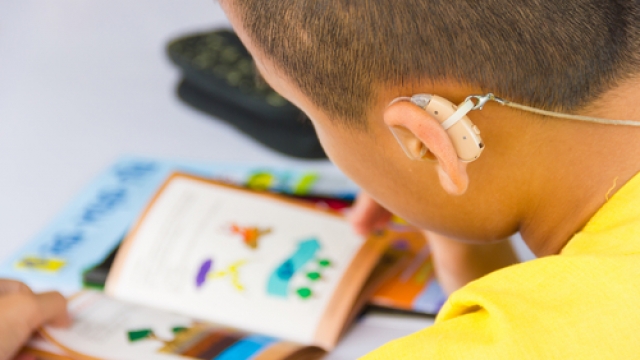Vivienne Ober is a spunky 9-year-old. She loves the color purple and playing with her kid sister.
But Vivienne is among the roughly 3 in every 1,000 children the National Institutes of Health (NIH) says are born with hearing loss.
Without her hearing aids, the world sounds like a cell phone call cutting in and out.
Vivienne's first hearing aids cost $7,000, plus ear molds, batteries and warranties. Her parents were shocked when they learned insurance didn't cover it.
"Our ENT and audiologist wrote letters to the insurance company and still they continued to deny it and listed it as cosmetic," Vivenne's mother Danielle Ober said.
Tena McNamara, an educational audiology consultant with Hawaii's Department of Education, says not treating hearing loss early can lead to long-term problems.
"There's a large body of research that has shown an association between untreated hearing loss and social isolation, loneliness, depression in children and adults," McNamara told Scripps News. "Access to hearing is very critical for a child's development."
A total of 28 states currently have insurance mandates for children's hearing aids that vary in age, dollar amount or frequency.
Lawmakers in New York, Michigan, Ohio, California and Hawaii are considering legislation that would add them to the list.
America's Health Insurance Plans (AHIP) is the national association that represents nearly 1,300 companies that offer health insurance.
Scripps News reached out but has not heard back on whether AHIP members consider hearing aids "cosmetic."
The ability to hear is key in the way a child speaks, understands and takes in the world. Dr. Dylan Chan cares for kids who are deaf or hard of hearing and says access to sound by way of hearing aids, sign language or spoken language is crucial by 6 months old.
Young children who wait longer may have some growth in their language, but Chan says they'll "plateau at a level that is lower" than kids who were provided with aid earlier.
As for Vivienne Ober, her family estimates they've spent more than $15,000 out of pocket so she can hear. That includes a special microphone system they crowdfunded for Vivienne's birthday that allows her to hear when people are out of earshot.
Most hearing aids last three to six years, and Vivienne's parents say they're already working to save up for the next pair.
Trending stories at Scrippsnews.com



